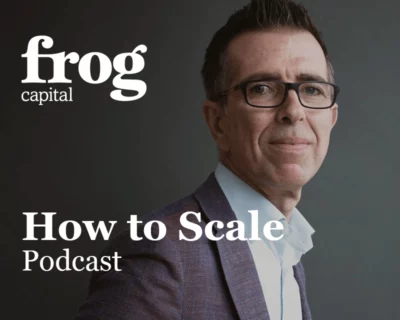Recently we hosted an excellent panel session entitled: “Doing Good as an Investment Thesis and the importance of Environmental, Social and Governance (ESG) to value creation.”
The panel was devised to build on work being done in Frog to better articulate our support for doing good and to show that ESG principles can be practical and value creating. The panel included three portfolio company representatives and a fellow investor:
Mathew Elson – CEO, Evotix – a leading European health & safety software provider
Stephan Bayer – CEO of sofatutor – Germany’s largest digital education business
Alexandra Lougovoy– Marketing and Communications Director, Vulog – Leading global player in mobility infrastructure software
Zoe VanderWolk – Head of IR and Sustainability at ETF Partners – Europe’s leading Venture Capital Investor in sustainable technologies.
Watch the video below.
Purpose
Matthew initially spoke about the benefits of a clear purpose, for Evotix being; “to help workplaces be safer”. The passion for this social mission to address the unacceptable current state of some workplaces drives alignment of senior executives, current employees, investors and drives recruitment of dedicated, high quality people.
Stephan noted that doing good was a “no brainer” for sofatutor, given its educational impact for schoolchildren. No one can ignore the poster in the company reception that says, “life is short, build stuff that matters”. This sets the tone for new recruits, investors, and any other visitor. All employees know and are excited by the purpose but also the company is exciting for its sustainable profitability and high growth so there is no compromise as might be the case in a charity or NGO.
Measuring impact
Alexandra outlined Vulog’s social contribution replacing private ownership of cars with car sharing to get cleaner cities, reducing congestion and pollution. Vulog measure relative impact so can demonstrate that 12 private cars, which only get used 4% of the time and average 1.5 passengers per trip, can be replaced by 1 car share. 12% of CO2 emissions are from cars so the opportunity is enormous; the pollution savings Vulog has driven to date is equivalent to planting 9 million trees.
Stephan talked about the potential conflict between reporting on impact and management bandwidth to do it. The important part is that good things happen “not that there is a glossy report about it.”
Zoe, bringing the impact investor perspective responded that there is a need for some reporting but agreed with Stephan stating; “reporting can’t be the tail that wags the dog”. Reporting needs to be proportionate for SMEs and authentic (sometime not the case with large reports). She expounded her own view that there was an artificial separation between sustainable commercial business and impact; “all investing should be impact; all businesses should be sustainable.”
Practical application of ESG
Matthew admitted that more “internal coherence” was required on ESG but essentially Evotix was doing the right things. Stephan highlighted the importance of the client base expectation’s; 10% of German speaking teachers use sofatutor and they expect to see high environmental and social standards especially concerning diversity and bias. Stephan noted a lack, like many tech companies, of gender diversity in senior management despite a requirement to have female candidate on the short-list. Alexandra added that Vulog, at 30% female employees, was doing exceptionally well for a tech company.
Zoe highlighted the key point that ESG is just a set of risk management tools and standards that every well-run company should be abiding by, whether they categorise it as ESG or not.
Stephan agreed that going too far with the messaging can create the wrong impression, citing the example of new graduates mistakenly thinking that an impactful, socially responsible employer would not engage in performance management.
Performance
It was agreed that ESG principles reflect an approach to doing things in the right way for any company, but that the right purpose is more important for employees, investors and management.
The panellists reflected that they could all demonstrate that digital transformation businesses with a positive purpose have proven to be more resilient and provide exciting commercial and investment opportunities.












